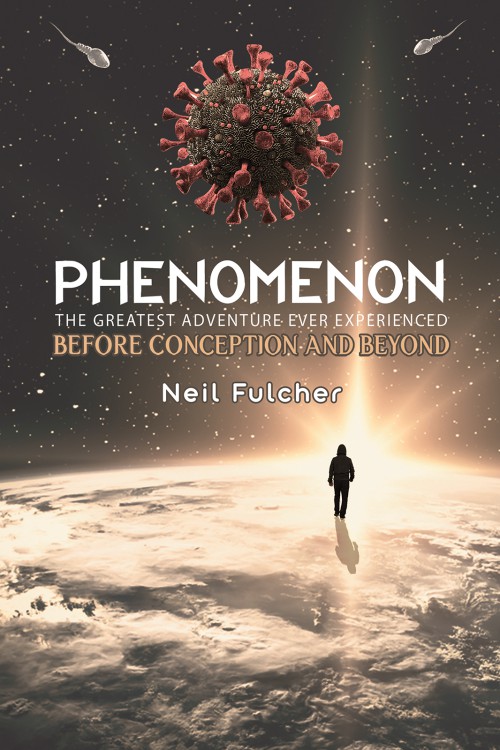
By: Neil Fulcher
*Available directly from our distributors, click the Available On tab below

Born and raised surrounded by heavy industry in the UK Yorkshire town of Rotherham, the vast majority of people around the author in the 1960s either worked in coal, steel or construction. In those days Rotherham was as hard as the steel it produced. Both men and woman were fiercely protective of their families, friends and hard won rights. Whole communities were forged together through their daily struggle to survive the polluted air, rivers and toxic chemical belching out from hundreds of factory chimneys. If you hung the washing out on any other day than a Monday it came in dirtier than it went out. Through all that hardship everyday life had plenty of belly laughs. It was that strong Rotherham camaraderie that allowed town folk to work hard and play harder. That ingrained search for fun, faith and fulfilment shaped Neil Fulcher’s journey which literally took him from this world into another becoming the greatest adventure ever experienced.
Neil Fulcher in Phenomenon took readers on a spiritual adventure to discover the origin of life and its ultimate destination. He narrated his own experience with the 'Trinitarians' and hoped that readers would undertake an adventure to understand the power and accessibility of the spiritual plain.
The book was presented in clean, well-edited writing (at least for a book of over 400 pages). The author's language drifted from philosophical at the beginning to emotional towards the end. Initially, the author presented his ideas in a rather complex way. It would not be an easy task for some readers to grasp the crux of the author's narration. I would admit that I was not freed from this initial struggle. Thankfully, it did get more straightforward towards the end. However, this might not serve the book well because non-resilient readers might dismiss it as too theological before getting the hang of it.
The book also brought to the fore the ancient battle for the human soul alongside the battle between good and evil. With his descriptive narration, clear images of this struggle were created. His references to 'samurai warriors,' allowed us to have a picturesque idea of what he described.
Neil brought the readers in tightly into the narration. The reader, tagged as '8,' was a character in this book. The ripple effect was that the reader became unequivocally part of the adventure as though it was their own experience.
I'm reluctant to consider what it must have cost the author to have presented such complex ideas of divinity. The 'Trinitarian' nature of God had been the subject of many conflicting philosophies, but the author's take on it was as unique as it was commendable. His dissection and logical analysis were effortless, though not surprising, as he wrote from experience. No matter a reader's opinion about the author's 'boldness' to discuss such a mysterious subject, they would be persuaded to think and examine the author's story closely. They would start to introspect on the reality of eternal life and death in the manner that Neil had presented.
The spiritual adventure captured in this book hinted at some resonating issues. The first of which was the problem of denomination and theology. These two factors have caused division within the church. Through this book's narration, it came out clearly that God was a God of all, irrespective of culture, color, gender, nation, or denomination. The second issue was the ever prominent role of social media in our lives. The author called it 'social manipulation' as he pointed out the controlling power that the media and our addiction to mobile phones had exacted over our existence.
The book was intrinsically about the undiluted power of God that transcends our existence. Neil brought to life the verse of the Bible that says, "before I formed thee in the belly, I knew thee." He firmly asserted that there was existence before conception — a ludicrous yet intriguing possibility. I believe that this book gave a lot of takeaway options for readers, one of which was this: 'God is light, and no darkness can put it out.'
The spiritual journey presented in Phenomenon was one that curious readers would enjoy, and I'd recommend it to seekers of spiritual truth and understanding. I only had a few concerns about the early parts of the book. However, it would be no reason to fault this book. Therefore, I'd rate it four out of four stars.
I feel that religion should be examined from more than just one religious perspective if one wishes to discover any real truth.
I find the idea of the reader becoming part of the story other than simply a spectator to be intriguing. I’d be interested to explore that further.
Social media has been one of the most difficult things to walk away from. I would really love to look into the points the author puts across.
What an intriguing book never read anything like this before. It's a mammoth read and will keep you going for a month. The plot will keep you guessing even longer, it seems to never end but when it does BANG what a finish. The biggest plus for me is the reader drives the story as the book uses my own name as I read it, genius that tough. Biggest downside loads of ancient Bible codes. My advice read the book don't stop reading to look up the codes it's not necessary as they are only confirming the factual side of what the author is proving. One of best philosophical novels I've ever read.
We use cookies on this site to enhance your user experience and for marketing purposes.
By clicking any link on this page you are giving your consent for us to set cookies